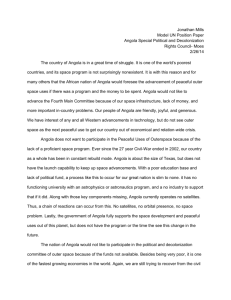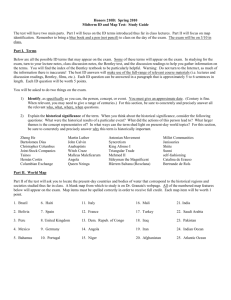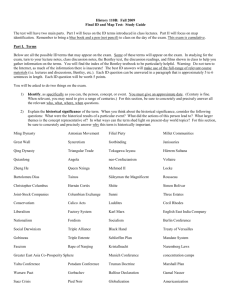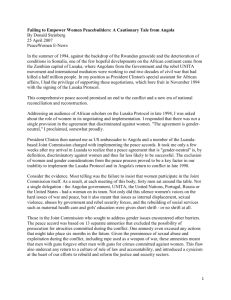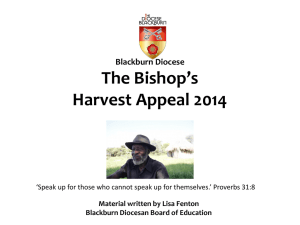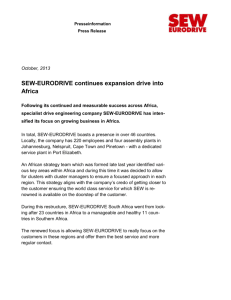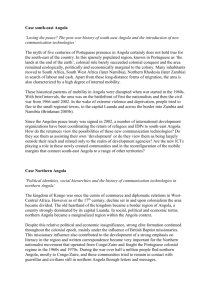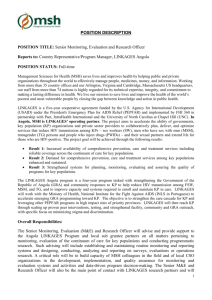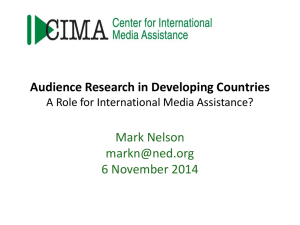a PDF version of Marisa's CV.
advertisement
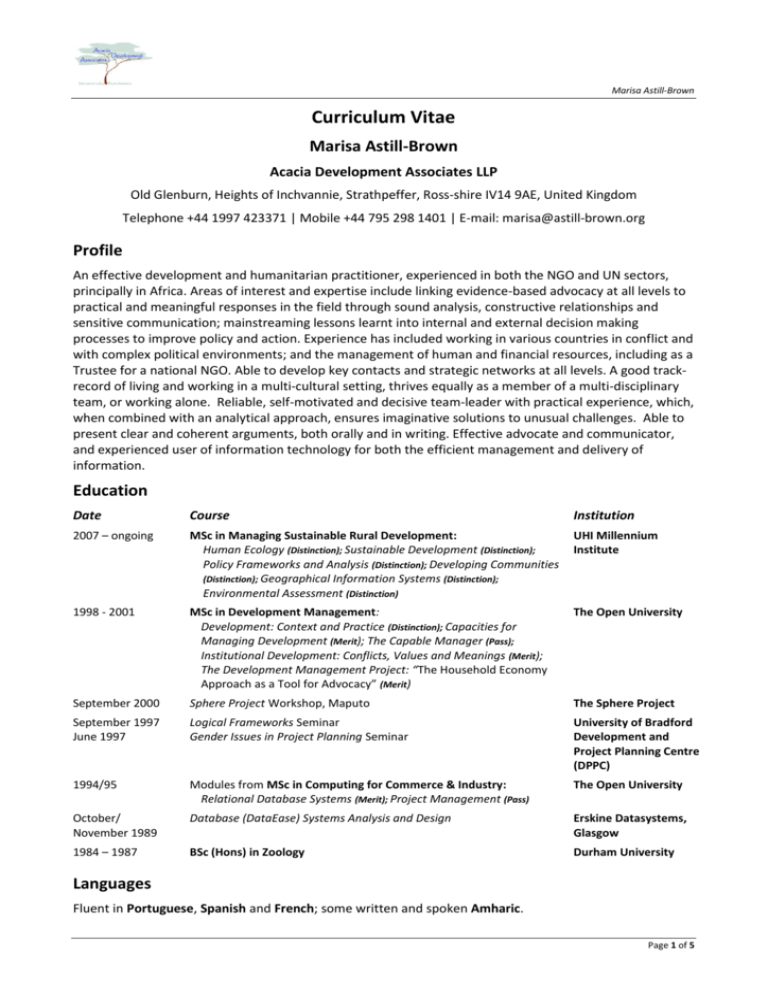
Marisa Astill-Brown Curriculum Vitae Marisa Astill-Brown Acacia Development Associates LLP Old Glenburn, Heights of Inchvannie, Strathpeffer, Ross-shire IV14 9AE, United Kingdom Telephone +44 1997 423371 | Mobile +44 795 298 1401 | E-mail: marisa@astill-brown.org Profile An effective development and humanitarian practitioner, experienced in both the NGO and UN sectors, principally in Africa. Areas of interest and expertise include linking evidence-based advocacy at all levels to practical and meaningful responses in the field through sound analysis, constructive relationships and sensitive communication; mainstreaming lessons learnt into internal and external decision making processes to improve policy and action. Experience has included working in various countries in conflict and with complex political environments; and the management of human and financial resources, including as a Trustee for a national NGO. Able to develop key contacts and strategic networks at all levels. A good trackrecord of living and working in a multi-cultural setting, thrives equally as a member of a multi-disciplinary team, or working alone. Reliable, self-motivated and decisive team-leader with practical experience, which, when combined with an analytical approach, ensures imaginative solutions to unusual challenges. Able to present clear and coherent arguments, both orally and in writing. Effective advocate and communicator, and experienced user of information technology for both the efficient management and delivery of information. Education Date Course Institution 2007 – ongoing MSc in Managing Sustainable Rural Development: Human Ecology (Distinction); Sustainable Development (Distinction); Policy Frameworks and Analysis (Distinction); Developing Communities (Distinction); Geographical Information Systems (Distinction); Environmental Assessment (Distinction) UHI Millennium Institute 1998 - 2001 MSc in Development Management: Development: Context and Practice (Distinction); Capacities for Managing Development (Merit); The Capable Manager (Pass); Institutional Development: Conflicts, Values and Meanings (Merit); The Development Management Project: “The Household Economy Approach as a Tool for Advocacy” (Merit) The Open University September 2000 Sphere Project Workshop, Maputo The Sphere Project September 1997 June 1997 Logical Frameworks Seminar Gender Issues in Project Planning Seminar University of Bradford Development and Project Planning Centre (DPPC) 1994/95 Modules from MSc in Computing for Commerce & Industry: Relational Database Systems (Merit); Project Management (Pass) The Open University October/ November 1989 Database (DataEase) Systems Analysis and Design Erskine Datasystems, Glasgow 1984 – 1987 BSc (Hons) in Zoology Durham University Languages Fluent in Portuguese, Spanish and French; some written and spoken Amharic. Page 1 of 5 Marisa Astill-Brown Career History 2009 to date Co-founder of Acacia Development Associates (ADA) 2007 – 2008 Consultancies for Save the Children (UK) Angola Programme Development of funding proposal to the DFID Governance and Transparency Fund to work with civil society organisations to strengthen their capacity to engage with government in a way which involves the active participation of children in the processes of local government. Development of funding proposal to the European Instrument for Democracy and Human Rights fund to strengthen the role of civil society in the promotion of human rights, guaranteeing the democratic participation and representation of citizens including children and adolescents, and specifically to enable civil society to participate actively in the process of good governance (preparation, implementation and monitoring) in relation to development programmes, including those for children. Structuring and development of country Thematic Programme Plan for Poverty and Economic Justice, the overall objective of which was improved lives for Angola's children through better governance based on citizen engagement and government accountability at all levels. February 2005 – May 2006 Part-time Consultant to Save the Children (UK) Ethiopia Programme Support to the Somali Region Early Warning project: edited detailed livelihood baseline reports and spreadsheets developed using the Household Economy Approach; developed 15 livelihood zone profiles for the whole region, and a livelihood summary for the whole region. Produced a publication comprising the livelihood profiles, regional summary and supporting data, together with a CD comprising detailed baseline and other information. The pack was designed to provide key information for decision-makers, stakeholders and those involved in emergency and longerterm livelihood planning. July 2003 – May 2006 Member of the Board of Trustees for the Gemini Trust, Ethiopia During a period of restructuring, worked with volunteers and other board members to help develop a new management structure for the organisation. The key challenge in addressing this issue centred around the tensions between this national NGO’s historical “safety net” character, and longer-term development of viable business ventures both to fund the safety-net work, and to provide beneficiaries (principally poor, urban families with twins) with practical skills and prospects to raise themselves out of the poverty cycle. Member of selection panel to recruit (national) Chief Executive Officer and other key positions for the organisation. July – November 2003 Consultant to Save the Children (UK) Angola Programme (SC) Worked with the SC Angola Programme at both country and headquarters levels to design a Programme Advocacy Strategy. This strategy was intended to complement the Southern Africa regional framework. It set out the key issues for SC in Angola, proposed advocacy objectives for the programme, and identified targets, opportunities, messages and possible approaches; it also included sections on evidence, further research and support required. An advocacy calendar was developed to highlight upcoming events and deadlines for advocacy work. Key characteristics of the strategy involved a) building and sustaining targeted relationships with e.g. donors, UN and other members of the international community to create opportunities for influencing Page 2 of 5 Marisa Astill-Brown and b) influencing through the development of solid relationships with government, community and civil society institutions, and by together developing effective models to guide policy-making and implementation. The key advocacy issues focussed around HIV/AIDS, child protection and access to health services. These within the context of a country rich in natural resources but with extremely poor development indicators as a result of rampant high-level corruption and poor governance. July 2002 – January 2003 Deputy Programme Director, Save the Children (UK) Angola Programme (SC) During a time of rapid change, maintained a broad political and contextual analysis of Angola to ensure SC Programme development responded to rapidly changing humanitarian needs as well as longer-term transition to development Responsible for overseeing SC’s humanitarian response in Angola funded by contributions from the Disaster Emergencies Committee for the Southern Africa crisis, including budget management, reporting and monitoring and evaluation Line management of key support staff, and overall responsibility for the management of a large social protection programme during a time of considerable change. This programme comprised three large grants (US, UK and Dutch governments) each with three year commitments, together addressing issues related to child protection in the context of post-war Angola, social policy influencing, working with civil society groups and networks, as well as in partnership with the Government of Angola. With the country programme senior management team, take a leading role in developing strategic and operational plans for SC’s work in Angola over the coming months and years, through broad country team participation and involvement. This also involved considerable budgetary planning and monitoring. Contributed to regular country situation reports detailing political, humanitarian and military developments, programme work and links with other organisations (UN, donors, national groups, communities etc) Represented SC in a variety of fora including with other NGOs, donors, the UN and the Government of Angola, and advocating on issues relating to inter alia child protection, food security and forced resettlement Revised and implemented organisational security guidelines regularly in response to the rapidly changing situation Took on Programme Director’s responsibilities in her absence, reporting to headquarters and regional level. Member of a SC global working group on Food Aid and Food Security in Emergencies Wrote an internal SC paper analysing the specific advocacy processes and experiences of the SC Angola programme over three years, looking at successes and failures, and identifying lessons learnt. Paper used as the basis for subsequent advocacy strategy work for the Angola programme. March – May 2002 Acting Programme Director, Save the Children UK Mozambique Programme (SC) Led the SC country team in the process of refocusing the country programme from emergency to development, including consultation with and participation by staff, partners and beneficiaries; resource-management; financial planning; project development; and donor strategy-building. This was carried out in line with a) a regional framework characterised by rights-based and participatory approaches and advocacy; and b) a country strategy paper and associated cross-cutting approaches including gender and age sensitivity/analysis, HIV/AIDS, protection, emergency preparedness and participation. Supervised a substantial restructuring of staff and resources – including analysis of staff responsibilities and supervision systems, and ensuring e.g. human resource issues were dealt with within Mozambican law, and disposal of assets within terms and conditions set by Save the Children and relevant donors. Page 3 of 5 Marisa Astill-Brown Represented Save the Children UK to the Government, other agencies, the UN, donors etc. Advocacy on issues of access to food, assessment- and analysis-driven food aid responses and child protection at national food security fora as an integral part of Save the Children’s regional advocacy in relation to the (then) current regional food security crisis, and wider advocacy in relation to child protection issues in the context of emergency responses. Member of the Save the Children Southern Africa regional management team. Carried out contextual analysis – at regional, country, provincial and district levels – to inform programme development and implementation Regular communication and reporting to partners, donors and other actors, and to regional and headquarters level of Save the Children Responsible for ensuring adequate systems were in place for the health and security of staff Responsible for the management of all financial and other resources and assets October 1999 – February 2002 Acting Deputy Programme Director (6 months); Humanitarian Assistance Advisor for Save the Children (UK) Angola Programme (SC) Represented the SC Angola Programme in the Programme Director’s absence (total of 7 weeks out of the 6 months), during high level UN visits, advocating on issues relating to child protection; also as a member of inter-agency delegations to make representations on key humanitarian issues to the UN Secretary-General’s Special Representative in Angola; included responsibility for programmes in three provinces, including Huambo Province at a time of heightened insecurity Designed and implemented SC Angola’s advocacy strategy in relation to the issue of forced displacement in Angola through Save the Children’s programme work in the field, consultation with other actors and beneficiaries; coalition-building with other organisations Preparation for SC’s presentation under the Arria Formula to the UN Security Council in New York, in March 2002, on the Humanitarian Situation in Angola Participated in UN Task Forces to analyse the changing context and scenario-setting exercises, following the death of Savimbi Managed an emergency non food relief response covering four provinces in Angola, meeting the non food needs of about 30,000 war-affected families in a twelve month period. Wrote the SC Angola Country Programme Emergency Preparedness Plan In April 2000, represented SC on a task force coordinated by the UN Office for the Coordination of Humanitarian Affairs (OCHA) to design and prepare for a country-wide programme of rapid assessments of critical needs, to analyse and make recommendations for action in the shelter and non food relief sector. In October 2000, represented SC on a task force to develop the UN Consolidated Appeal Process for 2001, specifically in the area of food security. Represented SC at regular and ad-hoc meetings on coordination of non food and food assistance, vulnerability assessment and analysis, security, protection, displacement and resettlement issues February - September 1997 Consultant Project Writer for African Information Society Initiative policy awareness campaign for United Nations Economic Commission for Africa based in UK Consultant documentation writer for the Initiative, preparing documentation to target a wide range of audiences. Presentations to Initiative partners, senior government officials of member states, and the private sector, describing the Initiative and its proposed activities. Preparation of promotional material for use at partner meetings, conferences and within expert groups. International partners in the Initiative include the International Development Research Centre, United Nations Educational, Scientific and Cultural Organisation, the World Bank and the International Telecommunication Union. Page 4 of 5 Marisa Astill-Brown February - December 1996 Project Co-ordinator for USAID-funded Greater Horn of Africa Electronic Communications Network Project for United Nations Economic Commission for Africa based in Ethiopia Designed and implemented a work-plan to link government institutions in the Greater Horn of Africa countries by e-mail, in order to facilitate the exchange of information necessary to prepare for regional meetings and to assist in the management of problems and crises common to the region. Managed the project budget of US$295,000, allocating resources in line with donor policies and guidelines. Travelled to participating countries and discussed the practical aspects of the implementation and training of the project with government and other officials. Designed and distributed information material concerning the activities and anticipated outputs of the project. Prepared progress, visit and financial reports for donors and project clients. Prepared project proposals for related activities in the region and in the sub-region for funding by international donor agencies. Prepared training programmes and workshops for project participants. March - June 1995 Project Manager for Donor Election Unit, Ethiopia Led the team that provided management support to international observer teams operating throughout Ethiopia, prior to the first national elections. Responsible for a project budget of over US$300,000, and a support staff of seven people. Liaison with the UNDP to ensure high standards of financial management, planning and reporting to the donors, including bilateral Missions, various UN agencies, the European Union, the World Bank and IMF. Produced briefing material and guidelines for teams of external election observers, which reflected the changing electoral and political environment. January 1994 - November 1995 Part Time Clinic Manager for British Embassy Clinic, Ethiopia Managed the provision of medical facilities, international and local staff, and resources of the clinic. Developed management information systems for stock, billing, staff etc. Chairman of Embassy Clinic Management Committee Advocated for and successfully developed the ensuing indigenisation of the post October 1990 - April 1993 British High Commission, Uganda Entry Clearance Officer and Visa Section Office Manager (2 years) Executive Officer and database writer, Aid Section (5 months) February 1988 - April 1990 Selection Officer, Desk Officer and Computer System Manager for the Project Trust Co-ordination of recruitment, administration and interviewing of potential volunteers. Organisation of, and participation in, selection, training and debriefing courses. Management of programme in Central and South America, including liaison with the appropriate national authorities, and visiting volunteers to monitor their effectiveness. Design / implementation of volunteer management information system and computer system manager. Page 5 of 5
